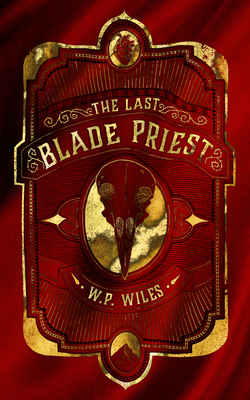THE LAST BLADE PRIEST - W. P. Wiles
I typically have not been very fond of epic fantasy. It's not that I don't like the stories or the characters or the fantastic adventures. It's the complex world-building that is involved in most epic adventures. Maybe it's an unknown learning disability or an undiagnosed ADD, but the more complex and foreign-sounding the names of characters and locations, the more challenged I am to read the book. When I struggle to understand the 'who' and the 'where' I generally can't enjoy the story. The very first sentence in the description on Goodreads would typically put me on edge: Inar is Master Builder for the Kingdom of Mishig-Tenh. Knowing this about myself and my reading habits, I will often eschew reading epic fantasy if I recognize that's what it is before I start reading.
I did not know that's what this book would be, which is a good thing, because despite my struggle with some of the people and places, I enjoyed this book.
Inar, the Master Builder mentioned above, comes from a family that has fallen in disgrace. Her brother and father were both found to be traitors and executed. Now the King's chancellor has selected Inar to become a spy for him. There's a huge danger in being a spy, but Inar has no choice.
In another part of the world, Anton is a blade priest who serves the Mountain God. His job has been to perform the human sacrifices to the god. But the 'Custodians' - the keepers of the faith and its path to the god - have put a stop to the sacrifices. This is good news for Anton, but he soon has to go on the run as another faction wants to take control of the region.
Inar, meanwhile, takes on the duty of shepherding a young girl, Duna, to the mountains. Duna seems to have a rare telekinetic power and she needs to be properly trained for her own safety as well as for those around her.
Author W. P. Wiles dumps a lot of the uncomfortable, tongue-twisting language into the book very early. Many of the names are too similar, causing even more confusion in my slow brain (are we talking about the Mishig-Tenh, the Elith-Tenh, or the Tzan-Tenh?). But the characters, particularly Inar and Duna, are so fascinating that I was able to ignore a lot of the busy detail to focus on the characters' needs and wants.
Wiles manages to keep the action moving so that we're not bogged down with a lot of reflection, commentary, and planning - traits that often slow an epic fantasy to a crawl. There was just the right amount of physical action, consistent throughout the book, to create nice rising action, building character and tension.
One of the aspects I really appreciated was that 'common' fantasy characters, particularly elves, weren't like the elves we see in Lord of the Rings or many fantasies. The elves here are evil little monsters, looking to get rid of humans. I loved this 'twist.' Surely this isn't the only book to take this kind of look at 'familiar' creatures, but combined with the rest of the storytelling, it was a nice addition.
Although I've found I don't typically enjoy epic fantasy, this proves to be the exception. This was an enjoyable read and I'm interested in following up on these characters.
Looking for a good book? W. P. Wiles has penned a very interesting and readable epic fantasy in The Last Blade Priest.
I received a digital copy of this book from the publisher, through Netgalley, in exchange for an honest review.
3-1/2 stars
* * * * * *
The Last Blade Priest
author: W. P. Wiles
publisher: Angry Robot
ISBN: 9780857669827
paperback, 508 pages

Comments
Post a Comment